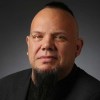Karen Rubel talks about vital mission of Nathan Adelson Hospice
Vegas Voices is a weekly series highlighting notable Las Vegans.
Heading into the July 4 holiday, Karen Rubel’s office was filled with flowers, sent to congratulate her on her new position as CEO of Nathan Adelson Hospice. Rubel assumed the role on July 1, as her predecessor and mentor of 12 years, Carole Fisher, transitions from CEO into a new position as principal adviser for strategic initiatives. As she introduced herself, Rubel asked whether I’ve ever visited the hospice.
“No,” I replied, pausing uncomfortably before continuing with an almost embarrassed afterthought. “Thankfully.”
Rubel has heard that response before. Many Las Vegans have heard of Nathan Adelson Hospice. But the end-of-life issues it confronts head-on are not topics many are in a rush to experience. After a dozen years with the organization, however, the Chicago transplant is clearly comfortable serving as a liaison between the local institution and her adopted hometown.
Review-Journal: What bought you to Las Vegas?
Karen Rubel: I moved here for a job at UNLV.
I wanted to live in Las Vegas. I had some friends who lived out here, and I was coming out in the late ’90s, when the casinos were going up and everybody was moving here. I had an opportunity to join the UNLV community and just really never looked back at that point. I just really felt connected here. … There’s no community that comes together around good things and bad things, when they happen, like Las Vegas.
How did you get into this field?
I was at another nonprofit in town, and my former boss was hired to do recruiting for Nathan Adelson Hospice. So he reached out to me and said “You’d be a great fit for the organization, come and interview.”
Did you have any personal trepidation about tackling this concept — the end of life?
I didn’t have any trepidation. But anytime that you’re interacting with people at this most vulnerable point, we always like to say we really can never have a bad day. Because we’re taking care of so many people who could be having a worse day. You just really get in touch with your compassion and your empathy in a way that you might not in other settings. We don’t get to have a do-over in hospice. We have one opportunity to deliver that care really well for that patient and family, and we don’t get to go back and do it over again. So while I didn’t have any trepidation, you are surrounded by people who are at the end.
Very early on in my career here we took care of a baby who was born with something terminal. And we all rallied around that baby. It had never been held by a human being — the mother was separated from the child. And we just spent weeks over there holding that baby and taking care of the baby. And while that would be sad to some, it was really affirming to me that I was part of a team that took care of that child.
What do you think is the greatest misunderstanding about hospice?
People think that hospice is a place. I think that is a misunderstanding. We do have two in-patient facilities: one on Swenson Street, which is our original, and one in the Mountain View Medical office building. And so when we talk about hospice I think people associate it with a place to go.
What the (reality) is, is that we go to your home, or wherever you call home. So you don’t have to come to hospice. We come to you.
This isn’t the kind of place many people are looking to learn about until there’s a need. What’s the face of this hospice that you wish more people could see before they need to see it?
We have a very dedicated staff. Our folks at the bedside are what we call angels because of the care they deliver. They’re experts at delivering that care at a time that the family is most vulnerable.
We have chaplains. We have social workers. We have a transportation program and a meal delivery program. We have a complimentary therapies program. So if you want to step outside of traditional medicine, we have essential oils, creams, massage therapy, art therapy. And then we have a very large bereavement program. Even before your loved one might pass away, we can provide some emotional support and some therapy and counseling. And then afterward, you have 12 months of follow-up and support. Those are some of the things people don’t realize that we offer.
Nathan Adelson Hospice is known throughout Las Vegas as a part of our community. Is that the norm in the industry or unique to Las Vegas?
I think we’re unique because of how we were founded. Nathan Adelson was an actual person. He was the first administrator of Sunrise Hospital. There was a connection to the community already when he died and they named the hospice in honor of him.
And we always have been available to the community. Through our uncompensated care program, we provide care to people of the community regardless of their ability to pay. If you’re uninsured or underinsured, we will provide hospice care to you.
So I think that just positioned us well as the community’s hospice. And we always want to keep that in mind. We always want to make sure that we’re connected to the community because the community has supported us for so many years.
Contact Al Mancini at amancini@reviewjournal.com. Follow @AlManciniVegas on Twitter.
























